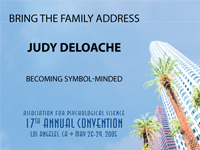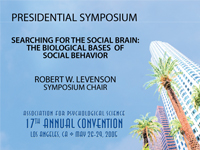APS Veterans

APS Veterans: Helen Murphy and Cyrilla Wideman.
To Cyrilla H. Wideman and Helen M. Murphy, John Carroll University researchers who have attended every APS Annual Convention, choosing a favorite one would approach the unthinkable, a task in the absurd realm of naming a most-loved child or picking the prettiest star in the sky.
“They’ve all been good,” Murphy said. “The Convention covers a broad area. Here you have an opportunity to see across the spectrum of research.”
“Also,” added Wideman, “we always get to see [APS Executive Director] Alan Kraut!”
For Wideman and Murphy, the Convention is also a forum to present their neuroscience research. In Los Angeles, they presented some of their recent findings, which suggest that the brain can become addicted to sugar in a similar way that it becomes addicted to drugs.
For four weeks, two types of rats — one that naturally produces a bodily substance called vasopressin and one that does not — were given daily access to food for 12 hours. During weeks two and four, the rats had access to glucose during the 12 hours of feeding.
When glucose was reintroduced in week four, both types of rats consumed even greater amounts than they had in week two. In addition, during the third week — the first off glucose since it was introduced — the rats were highly agitated, “with heads shaking and forepaws quivering.”
Though all the rats experienced increased consumption of glucose in weeks two and four, as well as dependence, withdrawal, and relapse symptoms, the vasopressin-producing rats showed slightly mitigated results, suggesting that a lack of vasopressin might exacerbate sugar addiction.
As for the New York Annual Convention in 2006 — Wideman and Murphy will be there, ready to embrace the new program format. “There aren’t going to be so many overlaps,” Murphy said. “That’s been one of the only problems in the past.”




APS regularly opens certain online articles for discussion on our website. Effective February 2021, you must be a logged-in APS member to post comments. By posting a comment, you agree to our Community Guidelines and the display of your profile information, including your name and affiliation. Any opinions, findings, conclusions, or recommendations present in article comments are those of the writers and do not necessarily reflect the views of APS or the article’s author. For more information, please see our Community Guidelines.
Please login with your APS account to comment.